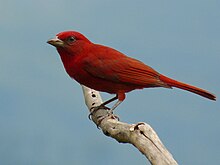The tooth-billed tanager (Piranga lutea) is a medium-sized American songbird in the family Cardinalidae.
| Tooth-billed tanager | |
|---|---|

| |
| Scientific classification | |
| Domain: | Eukaryota |
| Kingdom: | Animalia |
| Phylum: | Chordata |
| Class: | Aves |
| Order: | Passeriformes |
| Family: | Cardinalidae |
| Genus: | Piranga |
| Species: | P. lutea
|
| Binomial name | |
| Piranga lutea (Lesson, 1834)
| |

| |
Taxonomy
editThere six subspecies of Piranga lutea:[1]
- Piranga lutea testacea P.L. Sclater & Salvin, 1868 (highlands of northern Costa Rica and eastern Panama)
- Piranga lutea faceta Bangs, 1898 (Santa Marta Mountains in northern Colombia, mountains of northern Venezuela and Trinidad)
- Piranga lutea haemalea Salvin & Godman, 1883 (Amazonas and Bolívar in southern Venezuela, the Guianas, Serra Imeri in northern Brazil)
- Piranga lutea toddi Parkes, 1969 (mountains of central Colombia)
- Piranga hepatica desidiosa Bangs & Noble, 1918 (southwestern Colombia)
- Piranga lutea lutea (Lesson, 1834) (southwestern Colombia and northwestern Bolivia)
The tooth-billed tanager is sometimes treated as part of a more broadly circumscribed hepatic tanager species, where it makes up the lutea subspecies group (highland hepatic tanager).[2][3] However, the IOC World Bird List splits these birds into three species, also recognising Piranga hepatica (the hepatic tanager) and Piranga flava (the red tanager).[1]
References
edit- ^ a b Gill, F.; Donsker, D.; Rasmussen, P. (eds.). "Cardinals, grosbeaks and "tanager" allies". IOC World Bird List. International Ornithological Congress. Retrieved 28 April 2024.
- ^ "Cardinalidae Cardinals and Allies". Birds of the World Online. Cornell Lab of Ornithology, Ithaca, NY. Retrieved 28 April 2024.
- ^ "The Family Cardinalidae". Howard & Moore checklist. 4.1. The Trust for Avian Systematics. Retrieved 28 April 2024.